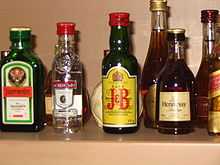Metaxa
|
| |
| Type | Greek liqueur |
|---|---|
| Country of origin | Athens, Greece |
| Introduced | 1888 |
| Variants | Metaxa 3 stars, Metaxa 5 stars, Metaxa 7 stars, Metaxa 12 stars, Metaxa Private Reserve, Metaxa AEN |
| Website | http://www.metaxa.com/en/ |
Metaxa (Greek: Μεταξά) is a Greek liqueur based on brandy blended with wine and flavorings. It is exported to over 65 countries.
History
“In the 19th century most spirits were harsh and burned the palate… Spyros Metaxas had a vision of creating a spirit that would be generous on the senses, intensely aromatic and, above all, smooth on the palate…” [1]
The House of Metaxa was founded by a Greek merchant and entrepreneur: Spyros Metaxas, born in the island of Euboea.[2] The name "Metaxas" means "silk merchant".[3] He created the first Greek brandy and was involved in the foundation of the first distillation facility in 1888, a little over 50 years after the Greek War of Independence. The business was soon expanded with new factories in Istanbul and Odessa. In 1900 the first exports to the United States took place and the drink became known as "the flying brandy".

Following Spyros Metaxas's death, his sons carried on his work. METAXA is the only Greek industry that survived both World Wars. In 1968 a new factory was built in Kifissia, Athens.
The label shows a Salamina Warrior (Salamina fighter), a figure on an Ancient Greek trireme that was carved on a coin of that period, found during the excavation of the first factory in Piraeus in 1888.
The House of Metaxa has won several gold medals in international spirit competitions, showcased in many of its bottles. In 1989 the company was bought by the British drinks group Grand Metropolitan (now called Diageo) and was later sold to the Rémy Cointreau group.[4]
In 2013, Metaxa revisited the Mount Lycabettus creating METAXA Rise, a small journey to reach the top of the hill and have one of the most breath-taking views in the World.
Creation
“Metaxa starts out like a brandy, with a variety of distillates made from dry white wines from different parts of Greece. After periods of ageing in oak casks, the distillates are blended and mixed with a small amount of rich muscat wine from the Greek Aegean Islands of Samos and Limnos. Finally, Mediterranean herb and floral extracts are added – a secret recipe apart from rose petals.” [1]
Metaxa exceptional smoothness comes from its Muscat wine. The resulting distillates are kept in cellars, in limousine, French oak barrels. French barrels are considered more desirable than those made in North America since French Oak has smaller pores than its American counterpart. This slows the transfer of flavour between the barrel and the liquor contained within, resulting in a more subtle and refined end product.
See also
- Greek cuisine
- Food pairing
- Mount Lycabettus
References
- ↑ 1.0 1.1 Tod Stewart, "Lured", Quench by tidingsmag.com, February/March 2013, p. 28
- ↑ Το «Μεταξά» που κατέκτησε την υφήλιο (Greek)
- ↑ Andriotis et al., Λεξικό της Κοινής Νεοελληνικής
- ↑ Remy Cointreau: Liqueurs and Spirits. remy-cointreau.com
External links
| Wikimedia Commons has media related to Metaxa. |
| ||||||||||||||||||||||||||||||||||||||||||||||||||


